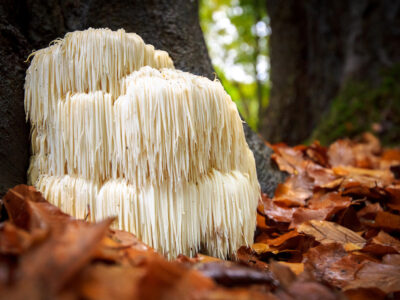Table of Contents[Hide][Show]
Holistic health is on the rise, and with good reason.
As more and more health-conscious consumers turn away from overprescribed, pricey medications and their side effects, they’re finding the best solution is right where it’s always been.
Outdoors, courtesy of Mother Nature.
One of these is lion’s mane, a powerhouse mushroom with the potential to improve your mental, emotional, and physical well-being.
From its roots in Eastern healing to its scientifically proven benefits, let’s explore lion’s mane and its potential impact on your health.
What Is Lion’s Mane?
Lion’s mane (Hericium erinaceus) is a mushroom that grows in the deciduous woods of North America, Europe, China, and Japan. In the wild, you’ll most likely spot them on fallen branches or dead trunks of beech, maple, oak, and other hardwood trees.
The fungus is characterized by its white, globe shape and the long, shaggy spine that resembles its name, lion’s mane.
It has been used for centuries in Eastern medicine and is now gaining popularity in the Western world for the many ways in which it elevates your overall well-being.
But just what are the health benefits of lion’s mane mushrooms? Should you be taking a lion’s mane supplement?
Let’s take a look at the benefits of lion’s mane, so you can decide.
6 Health Benefits of Lion’s Mane
Lion’s mane contains natural bioactive compounds, physiological beneficial chemicals that increase the overall health benefits of certain foods or drinks.
In lion’s mane mushrooms, these can positively impact your physical, emotional, and mental well-being in big ways. Let’s take a closer look…
1. Improves Cognition
Declining brain health is often associated with aging.
As you get older, your brain will find it more difficult to produce new brain cells and create new connections, known as neural pathways, between them. This is one of the factors that leads to cognitive decline, from brain fog to dementia, in older populations.
Lion’s mane contains two substances, hericenones and erinacines, that may prompt the growth of new brain cells by stimulating the nerve growth factor (NGF).
And, studies show that lion’s mane mushrooms may also have a neuroprotective function, reducing the damage created by neurodegenerative disorders such as dementia or Alzheimer’s disease.
But the cognitive health benefits of lion’s mane mushrooms aren’t reserved for the elderly.
Neuroplasticity is important at every age to keep your mind focused, sharp, and bright.
2. Helps Fight Depression and Anxiety
There are many physical and psychological conditions that can contribute to depression, and chronic inflammation appears to be one of them.
Lion’s mane mushrooms, with their anti-inflammatory properties, have also been linked to reduced symptoms of depression and anxiety.
Diving further into how lion’s mane can help with depression, other studies have shown that lion’s mane extract can help regenerate brain cells in the hippocampus.
Among other things, this is the part of your brain that processes emotions and regulates your emotional response. By supporting the regeneration of this region and improving its function, studies show that lion’s mane can relieve depression and anxiety.
And finally, another study of lion’s mane showed that consuming lion’s mane for just four weeks significantly reduced anxiety in menopausal women.
Related
Managing Stress and Anxiety
What’s the difference between stress and anxiety? Learn the symptoms and triggers of each to identify which is affecting you, the link between your gut and mental health, and how to overcome them.
3. Regulates Blood Sugar and Diabetic Symptoms
But the lion’s mane health benefits are more than just mental and emotional. Lion’s mane is good for your physical health, too, starting with managing your blood sugar level.
If your body is unable to regulate your blood sugar, the consistently elevated level of sugar in your bloodstream will eventually lead to diabetes and its side effects—from obesity to vision to nerve damage.
Recent studies have shown that lion’s mane blocks the enzymes that break down carbohydrates, making it more difficult for your body to digest and absorb them and turn them into sugar. This lowers your blood sugar level, reducing the possibility of diabetes.
Lion’s mane may also be beneficial if you’ve already developed diabetes.
One of the diabetic symptoms we mentioned earlier was nerve damage which can be especially painful in the hands and feet.
According to laboratory studies, in just 6 weeks lion’s mane lowered both blood sugar levels and neuropathic pain levels.
4. Promotes Heart Health
Lion’s mane also improves your heart health in two ways, by lowering cholesterol and lowering your blood pressure.
Like other soluble fibers, lion’s mane contains beta-glucans, substances that bind to cholesterol. Instead of allowing cholesterol to clog your arteries and cause heart damage, beta-glucans push cholesterol through your digestive tract and eliminate it from your body.
Thanks to this function, studies show that lion’s mane can reduce low-density lipoprotein, LDL, the “bad” cholesterol.
Another risk factor for heart disease is elevated blood pressure. The same beta-glucans that can lower your cholesterol can also lower your blood pressure, making it doubly effective at supporting your heart health.
5. Feeds Beneficial Bacteria for a Healthy Gut
Your gut is already teeming with bacteria, but lion’s mane can help make sure that it’s home to the right kinds of bacteria.
The bacterial colonies living in your gut include beneficial (“good”) bacteria and pathogenic (“bad”) bacteria. They live in a tenuous balance in the limited space available in your gut.
When the beneficial bacteria flourish, they crowd out the bad bacteria. This supports almost every aspect of your health, from digestive health to emotional well-being.
And lion’s mane plays an important role in the health of your gut microbiome.
Here, it works as a prebiotic, feeding and fueling the beneficial bacteria living in your gut so they can win out over the pathogenic bacteria.
Multiple studies also show that lion’s mane can treat digestive issues, including inflammatory bowel disease (IBD), ulcerative colitis, and other digestive issues.
If you take lion’s mane for your digestive health, you may also want to pair it with a spore-based probiotic supplement. Our favorite is Just Thrive Probiotic.
Probiotics are bacteria similar or identical to the beneficial bacteria already living in your gut microbiome. When you take a probiotic supplement, the bacteria in them join forces with the good bacteria in your gut, creating a balanced and healthy gut.
Spore-based bacteria—like those in Just Thrive—are especially powerful because they are able to survive the treacherous journey through your stomach acids and enzymes, thanks to their natural endospore shell. Most other probiotics cannot survive these conditions, and therefore are unable to make any impact on your gut health.
With a spore-based probiotic adding its force to beneficial bacteria and lion’s mane feeding them, your gut will have the support it needs to reach optimal condition!
Related
Why Your Body Needs Spore Probiotics
Discover why spore probiotics are the best probiotics and what look for in a supplement so you can receive the most health benefits.
6. Supports Your Immune System
Can a mushroom help you stay healthy? Believe it or not, keeping you healthy is actually one of the biggest health benefits of lion’s mane.
We’ve already shared the positive impact that lion’s mane has on gut health.
But your gut doesn’t just house bacteria. Surprisingly, it’s also home to roughly 80% of your immune system. So your gut health has a direct impact on your immune health and immune response.
Studies show that by supporting the development of a robust gut microbiome, filled with thriving colonies of beneficial bacteria, the lion’s mane also promotes a healthy, strong immune system.
Other Health Benefits of Lion’s Mane Mushrooms
The health benefits above are the most common reasons why people take lion’s mane, and the most proven.
But lion’s mane can also provide other health benefits.
- Lion’s mane contains a number of nutrients that are essential to your well-being, including potassium, iron, and B vitamins.
- Lion’s mane may help prevent and fight cancer. In fact, one study showed its effectiveness against liver, colon, and gastric cancer cells.
- Lion’s mane shows antioxidant properties, which help fight inflammation and oxidative stress, both of which can contribute to chronic illnesses and autoimmune disorders.
- Applied topically, lion’s mane extract can help speed up wound healing.
- Lion’s mane extract may help with nerve cell damage, repairing injured nerve cells and encouraging the production and growth of new nerve cells.
How to Take Lion’s Mane
Are you ready to see the benefits of lion’s mane for yourself?
Lion’s mane mushrooms can be consumed the same way as most other mushrooms.
- Raw lion’s mane mushrooms can be added to salads or sandwiches.
- Lion’s mane can be cooked as a side dish or added to main dishes such as soups, stews, pasta, and risotto.
- Dried lion’s mane can be steeped in tea or added to coffee, smoothies, sauces, or gravy.
Lion’s mane is also available as a supplement. You can purchase it over the counter in tablets, capsules, powder, or tinctures, perfect if you don’t like its mild seafood-like flavor or want to ensure that you’re getting enough of this health-supporting fungus.
Our favorite version of it is in Focus & Memory by Just Thrive. It features lion’s mane and other ingredients that work together to support your brain health.
- Citicoline, to promote memory and focus
- CognatiQ®, to support healthy BDNF levels, which helps the brain produce new brain cells and create neural pathways between them
- Caffeine, to increase alertness and concentration
- KSM-66® ashwagandha root extract, which shields your brain from cognitive stress, balance cortisol, and promotes BDNF growth
- Vitamins B12 & D3 to support swift brain signals, healthy neurotransmitter production, and smooth communication between brain cells
Together with lion’s mane, these ingredients turn your brain into a cognitive powerhouse, supporting a variety of peak mental functions and helping you feel alert, present, and bright all day long.
Final Thoughts
Recent studies and centuries of anecdotal evidence come to the same conclusion.
Lion’s mane mushroom works!
Whether you choose an easy-to-take supplement, add it to your favorite recipes, or both, lion’s mane can help you feel your best physically and psychologically.
You May Also Like…







